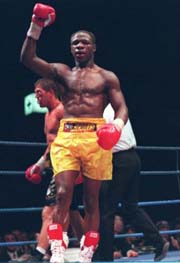|
On the east side of the pond that is the Atlantic Ocean is a small
group of islands known variously as the United Kingdom, Great
Britain, Britain and, to many, 'Ingle-land'. We're a funny
lot, the British - not only are we unable to decide what our
nation is called, but we still believe, even in the face of
overwhelming evidence to the contrary, that we are leaders in
world sport. Granted we do probably still command the higher
echelons of the Darts and Snooker worlds but our history is, on
the whole, one of inventing sports and exporting them to the rest
of the world who then promptly beat us at them. We invented
the 'glorious game', Football - you know real football where you
kick the ball with your foot. The fact that the English
still boast of their 1966 World Cup win speaks for itself.
And then there is cricket, a sport I
canít comprehend
myself
,
and which PJ O'Rourke memorably described as 'a sport no-one
understands but the whole world still beats you at'.
Boxing was practised at ancient Greek Olympic Games but it was it
was in the 1700s that our modern sport had its origins.
James Figg, 'Master of ye Noble Art of Defence' as his business
card described him, set up the first real gym in London's
Tottenham Court Road in 1719, Jack Broughton set down the sport's
first formal rules in 1743 (among these rules incidentally
was the instruction that 'the winning man to have two-thirds of
the money given, which shall be publicly divided upon the stage'.
Imagine if we brought that one back!) and, of course, it was the
Marquis of Queensberry who set down the modern rules. Our
problems began when we let 'Johnny Foreigner' join in the fun.
Ok, these days we do have our first
British undisputed World Heavyweight champion but he spent most of
his life in Canada and is not exactly the most exciting fighter in
the world. And we can rely on the peculiar British bias
displayed by the WBO to allow us to maintain the illusion of a
long list of 'great' world champions. But these anomalies
fail to obscure the fact that, generally speaking, the rest of the
world whups our asses. The British public have, of course,
been brought up to appreciate a glorious loser more than a winner.
But occasionally a fight comes along in which the combatants bear
their souls in a display which makes all this irrelevant.
The late 1980s and the 1990s has not been the best period in
middleweight history. Yes there have been talented fighters,
Michael Nunn, James Toney and Roy Jones spring to mind, but they
either burned out, faded away or moved up in weight. 'Superfights'
failed to materialise or, when they did, proved to be damp squibs.
But in November 1990, in Birmingham England, a contest between two
British fighters proved to be the most exciting middleweight fight
of the period, indeed a fight which bore comparison to the
great middleweight fights, even the Zale-Graziano and
Hagler-Hearns classics.
 WBO middleweight champion, Nigel Benn's fighting style was very
much death or glory, knockout or be knocked out. His early
career consisted of a rampage through a series of what he called
'Mexican road-sweepers' - man of questionable ability whose role
was to be knocked over quickly and all of whom kept up their end
of the bargain. While fun to watch this left Benn largely
unprepared for his first serious test against fellow Briton
Michael Watson. Knocked out in six rounds, Benn went back to
the drawing board in an attempt to add some defensive skills to
his fearsome punching power. This was mostly unsuccessful
however as his natural tendency towards a 'tear-up' led Benn back
to the gung-ho style he had made his own. He took the WBO
title by stopping Doug DeWitt was knocked down in the process.
His first defence was a first round stoppage of Iran Barkley but
this was not the blow-out that such a result suggests, Benn being
in serious trouble himself before the stoppage. Despite this
most favoured Benn to beat the largely untested, eccentric Chris
Eubank.
WBO middleweight champion, Nigel Benn's fighting style was very
much death or glory, knockout or be knocked out. His early
career consisted of a rampage through a series of what he called
'Mexican road-sweepers' - man of questionable ability whose role
was to be knocked over quickly and all of whom kept up their end
of the bargain. While fun to watch this left Benn largely
unprepared for his first serious test against fellow Briton
Michael Watson. Knocked out in six rounds, Benn went back to
the drawing board in an attempt to add some defensive skills to
his fearsome punching power. This was mostly unsuccessful
however as his natural tendency towards a 'tear-up' led Benn back
to the gung-ho style he had made his own. He took the WBO
title by stopping Doug DeWitt was knocked down in the process.
His first defence was a first round stoppage of Iran Barkley but
this was not the blow-out that such a result suggests, Benn being
in serious trouble himself before the stoppage. Despite this
most favoured Benn to beat the largely untested, eccentric Chris
Eubank.
Taking a leaf out of the young Cassius Clay's book, Eubank created
a persona for himself which made him easy to hate. He
professed to hate the sport which paid his bills. His time
in the ring was spent posing to the crowd, going for a walk
between rounds, looking down his nose at ringsiders and generally
looking like a prat. His fighting style seemed to consist of
practising Tai-Chi stances and avoiding his opponents frustrated
attempts to land a punch on him. While untested Eubank had
shown that he was the possessor of good punching power and a solid
chin. He had really talked himself into this fight telling
all who would listen, and many who wouldn't, that he would
demolish his rival and generally getting under Benn's skin.
Eubank could be a frustrating fighter to watch as his frankly
tedious decision win over Eduarro Contreras showed.
Dismissed as a challenger by Benn's then promoter Ambrose Mendy on
the strength, or lack of it, of this performance Eubank responded
by KOing his nest opponent in twenty seconds. Even as the
referee was counting out the unfortunate Renaldo Dos Santos Eubank
was taunting Mendy, 'Bring me your boy.' When the fight was
inevitably made Eubank let it be known that he had bet £1,000 at
odds of 40-1 that he would KO Benn in the first round.
----------
 The fight proved to be as much a mental as a physical battle and
from the start Eubank set out to prove his superiority. The
mind games began even as Benn climbed into the ring to be
confronted with a challenger who had stood immobile as the
champion had taken his long ring-walk and remained so - gloves
held together at chest level, in a trance-like state, seemingly
oblivious to all that was going on round him. Benn must have
wondered what he had in front of him.
The fight proved to be as much a mental as a physical battle and
from the start Eubank set out to prove his superiority. The
mind games began even as Benn climbed into the ring to be
confronted with a challenger who had stood immobile as the
champion had taken his long ring-walk and remained so - gloves
held together at chest level, in a trance-like state, seemingly
oblivious to all that was going on round him. Benn must have
wondered what he had in front of him.
Eubank began the fight in a Ken Norton-like stance and tried to
land an unorthodox lead right. When this failed he settled
into a jab and move strategy but it was a hard punishing jab
rather than a range-finder. In a clinch Benn attempted to
impress with his physical strength by lifting his opponent but the
round was Eubank's. Eubank then stalked the ring during the
interval ignoring his trainer's exhortations to sit on his stool.
Early in the second Eubank adopted a tactic he was to use for the
remainder of the fight and one which would become familiar to
British audiences for the next several years. He would stand
completely still, like a cobra ready to strike, trying to draw
Benn in. He avoided Benn's attack and countered with two
hard chopping rights.
But Benn caught Eubank too. A hard right cross tested the
challenger's chin which passed with honours. A two handed
flurry from Eubank had Benn reeling on the ropes as the bell
sounded. Early in the third Benn's left eye was showing
signs of damage but he rallied to win the round some withering
hooks to the body hurting Eubank who finished the round with blood
seeping from his left cheek. The frenetic pace continued in
the fourth which Benn also took with some ferocious punching.
But in the fifth Benn seemed unable to avoid Eubank's blows.
He tried to bob and weave but his eye by this stage was nearly
closed and Eubank's shots were fast, accurate and full of pain.
Eubank's success continued in the sixth as he again backed Benn
up. But suddenly he dropped to one knee. The crowd was
on it's feet but referee Richard Steele ruled a low blow and
replays showed Benn land a hard uppercut to the groin.
Eubank was given half a minute or so to recover but it was evident
at the start of the seventh that he had not fully shaken off the
foul's effects. Benn charged forward carelessly, ripping
hooks to the body. At one point Benn landed a series of hard
rights to his opponent's head which was locked in Benn's left
elbow. Another low blow caused Eubank to complain to Steele.
Benn laughed as he steamed forward and mocked Eubank's complaints.
Early in the eight the impression that Eubank was fading seemed
confirmed when he went down from a short right which landed behind
the ear. He again complained to Steele - he had slipped on a
patch of water - but the referee gave him the mandatory eight
count.
Benn's eye was closed as the ninth started and Eubank took full
advantage. He landed hard withering jabs and followed with
clubbing rights. Benn shouted defiance and tried to rally
but was suddenly stiffened by a brutal right and retreated to the
ropes. Eubank steamed forward and drove Benn into a neutral
corner. He landed at will as Benn's attempts to bob and
weave proved futile. Steele called a stop with four seconds
left in the round. There were tears from the now ex-champion
but no complaints. Eubank fell to his knees exhausted his
face showing the marks of battle. Both men looked like they
had been to hell and back and in a sense they had.
Eubank's
victory did not prove that he was the best middleweight
in the world, of course; he hadnít yet proved himself the best
in Britain
,
but both men had proved their courage and mettle. Each
could hold his head high as a warrior though neither would want to
prove it in such a fashion too regularly. Boxing News editor
Harry Mullan described the fight as 'the best I have seen in a
British ring' and it will be a long time before it is equaled.
Back
To WAIL! Contents Page
|